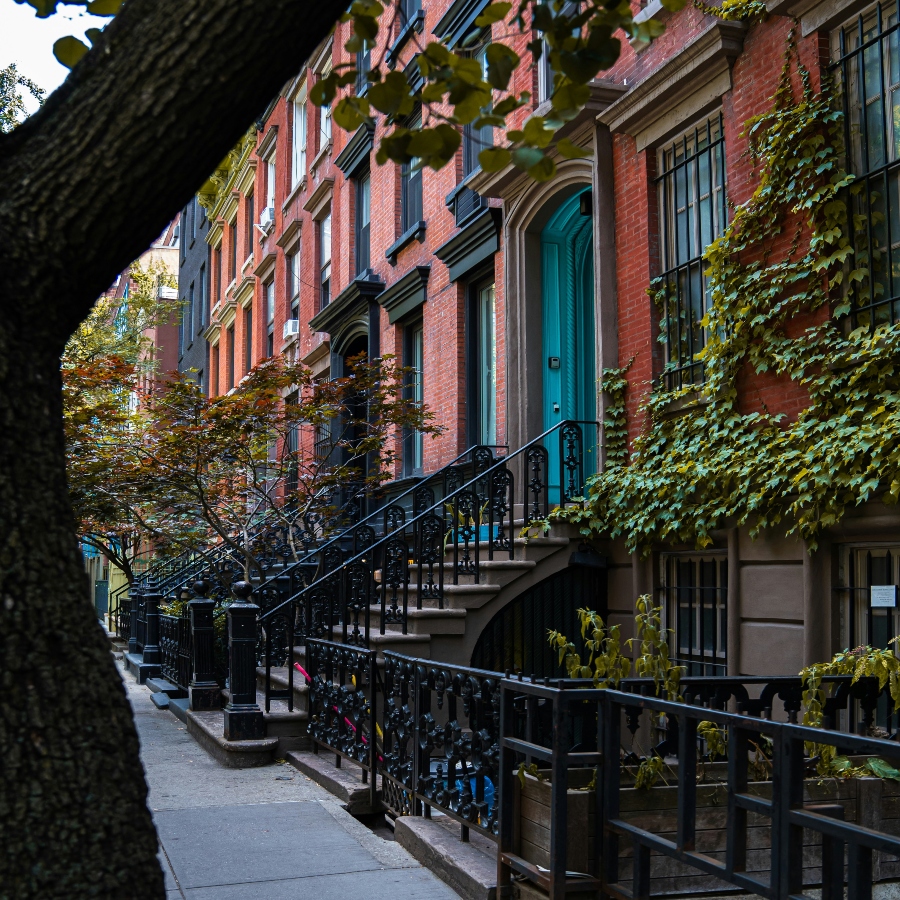I felt like television static that year—glossy-eyed afternoons at The Bitter End with a magazine straddling my lap, ears straining to dissect the waves: people chattering, milk steaming, door opening and closing—I was shimmery around the edges.
Most evenings, I drifted home through unexplored stretches of the city, somehow landing on the sidewalk outside my building. My roommate, Jolly, sat folded knees-to-chest, smoking a Montclair on the bottom step.
“Did you pass that accident?” She asked.
“Accident?”
“Don’t you usually take Jefferson? I read on Twitter that it was pretty gruesome.” I didn’t say anything. “Maybe accident’s the wrong word,” she said, stubbing out her cigarette. “They said the scene was active and graphic.”
“I don’t know what you’re talking about.”
Apparently, someone had threatened to jump off the parking garage near the museum and then done it. Jolly talked about it for ten minutes—or maybe thirty.
She stared at me.
“Sorry, did you ask something?”
“You just don’t seem very present.”
“I don’t feel very present.”
“Maybe we should talk about something else,” she said.
I shrugged.
“You know Cora’s seeing a new girl?” She asked. “She’s always making this dumb face.” She raised her brows and pursed her lips.
“You don’t have to say that,” I said. “I’m honestly happy for Cora and her new girl.”
Cora and I were never a good match. We met when it was too hot out for logic or good sense. Humid twilights in August, sprawled on damp grass after the sprinklers ran in the public park, sucking on cherry pits and stained fingers. I’d trace along each bump of her knuckles, her hand in a loose fist on my stomach.
But all throughout winter, we were sullen, ladling our melancholy into each other until we both overflowed. Wine-tinged mouths dripping passive-aggressive remarks or nothing at all for days. It’s a wonder we made it six months each year, cyclically parting from March to July.
As the days grew long and sticky, we inevitably fell back together like mice into a bowl of oil, climbing atop each other to catch our breath. I don’t know if we kept the cycle up for the routine or because we couldn’t fully wash the oil off during our months apart. Our last split, Cora had told me, would be the final one.
“There’s nothing I can say that will make you feel better,” she said, boxes stacked in the hallway behind her. I wanted to ask, how about ‘never mind, I still love you?’ but her phone rang before I could open my mouth.
“This is Cora,” she answered, a plastic bag stuffed with dirty clothes and half-empty shampoo bottles digging into her soft inner elbow. She struggled to pull the apartment door open with her flexed foot. “I can talk—I was just wrapping something up,” she said into the phone.
By late September, she was with another, and I was taking a lot of long walks.
I’d been thinking about death that day when a stranger leapt from the parking garage near the museum, but I hadn’t been thinking about it like that. I’d been thinking about the first time you try to recall an inane detail about an ex and realize you can’t find it. What was her first dog’s name again? I had former lovers who could be dead by that metric—but like an oil stain, some people are impossible to completely wash away.
“Wanna grab something from Leo’s?” Jolly unraveled, standing.
“I’m not hungry,” I lied. “I’m gonna call it an early night.”
I climbed the three curving staircases to our attic apartment. With each floor, the stairwell grew darker, the air thicker. Even during the day, the hallway to our door felt like wading through black velvet, only the blue light of a phone screen to guide the way.
In my dimly lit kitchen, denouements swirled like fog, and I found myself rinsing lentils in a sieve over the sink. I used to sort the lentils while Cora peeled the garlic—I hated the paper-thin skin beneath my nails, perfumed oil seeping into my fingerprints. Even when we weren’t talking, she peeled the alliums. One night toward the end, we stood hip-to-hip in silence, Cora peeling, me dicing. She placed a naked yellow onion in my hand; I took it without a word. At some point, as I hacked into the celluloid-like rings, I realized she’d stopped moving.
“Do you need something else to do?” I asked without looking up.
Silence. I turned, and she stared straight ahead, eyes welling. “Cor, you can’t just be upset without telling me why.”
“Nothing,” she shook her head. “No, it’s just the onions,” she managed to choke on a laugh. I laughed with her, but I knew it wasn’t the onions. It was forgetting to return her texts when I went out with friends and lying about what I’d eaten all day. It was sneaking away to the bathroom after each meal and ignoring her for a week if she talked to other girls at the bar, even though I’d been the one to kiss someone else.
On my own, I overcooked the lentils—burnt yet soggy. Squatting on a stool beside the compost bin, I spooned them into my mouth anyway. My therapist said I should build a ritual around eating—set the table, use my favorite hand-thrown bowls, tuck my phone away—she said it would help me stay present, find my body’s cues.
But I didn’t want to feel my heart’s rapid jostling—a reminder that my body was soft, weak, and filled with blood—that it would burst on contact with pavement from a few stories up. I was tired of months seeping between my fingers as I lolled fully clothed atop the comforter for a time-lapse of seasons. Was it a kind of death? Those last few flickering scenes before sleep, like rainbow-gray waves collapsing across a television screen, sometimes felt like falling.

